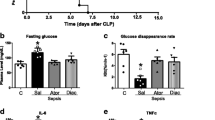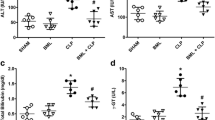Abstract
The aim of the present study was to determine whether timing of insulin administration influences the hepatic and serum proinflammatory and anti-inflammatory cytokines during endotoxemia stimulated by lipopolysaccharide (LPS). Eighty-one male Sprague–Dawley rats were divided into different time groups and insulin was given 30 min pre-LPS administration or hour 0, 1, 3, 6, 12, 24 after the induction of endotoxemia, respectively. Hepatic and serum proinflammatory cytokines IL-1β, IL-6, and TNF-α, and anti-inflammatory cytokine IL-10 were detected 24 and 48 h after the induction of endotoxemia. Compared with sham control rats, serum concentrations of proinflammatory cytokines IL-1β, IL-6, and TNF-α and anti-inflammatory cytokine IL-10 significantly increased on 24 and 48 h after induction of endotoxemia. Similarly, LPS administration also significantly increased the hepatic IL-1β, TNF-α, IL-6, and IL-10 protein concentration 48 h after LPS injection. Compared with levels in positive LPS controls animals receiving saline, on 24 and 48 h after LPS injection, insulin administrated ahead of 6 h after LPS injection significantly decreased the serum IL-1β, IL-6, and TNF-a concentration (P < 0.05), and significantly increased anti-inflammatory cytokine IL-10 concentration (P < 0.05); hepatic IL-1β and IL-6 expression were (P < 0.05) significantly decreased compared with levels in positive LPS controls. But, the significant decrease of hepatic TNF-a expression and significant increase of hepatic IL-10 were only seen in the animals in which insulin was administrated at 30 min pre-LPS or coadministrated with LPS. Insulin administrated 6 h after LPS injection lost the ability to significantly reduce serum or hepatic IL-1β, TNF-α, and IL-6 concentrations. Insulin has a protective role in systemic inflammatory response syndrome related to sepsis, such as downregulation of proinflammatory cytokines and upregulation of anti-inflammatory cytokine production. However, timing of insulin administrated may change its effect of inflammatory response in endotoxemic rats. Insulin administrated 6 h after LPS injection weaken the ability to protect inflammatory response related to sepsis.


Similar content being viewed by others
References
van den Berghe, G., et al. 2001. Intensive insulin therapy in the critically ill patients. The New England Journal of Medicine 345(19): 1359–1367.
Van den Berghe, G., et al. 2006. Intensive insulin therapy in the medical ICU. The New England Journal of Medicine 354(5): 449–461.
Brunkhorst, F.M., et al. 2008. Intensive insulin therapy and pentastarch resuscitation in severe sepsis. The New England Journal of Medicine 358(2): 125–139.
Finfer, S., et al. 2009. Intensive versus conventional glucose control in critically ill patients. The New England Journal of Medicine 360(13): 1283–1297.
Viardot, A., et al. 2007. Potential antiinflammatory role of insulin via the preferential polarization of effector T cells toward a T helper 2 phenotype. Endocrinology 148(1): 346–353.
Jeschke, M.G., et al. 2004. Insulin attenuates the systemic inflammatory response in endotoxemic rats. Endocrinology 145(9): 4084–4093.
Honiden, S., et al. 2008. Early versus late intravenous insulin administration in critically ill patients. Intensive Care Medicine 34(5): 881–887.
Langouche, L., et al. 2007. Effect of intensive insulin therapy on insulin sensitivity in the critically ill. Journal of Clinical Endocrinology and Metabolism 92(10): 3890–3897.
Osuchowski, M., et al. 2006. Circulating cytokine/inhibitor profiles reshape the understanding of the SIRS/CARS continuum in sepsis and predict mortality. The Journal of Immunology 177(3): 1967.
Van den Berghe, G., et al. 2003. Outcome benefit of intensive insulin therapy in the critically ill: Insulin dose versus glycemic control. Critical Care Medicine 31(2): 359–366.
Zanotti, S., and A. Kumar. 2002. Cytokine modulation in sepsis and septic shock. Expert Opinion on Investigational Drugs 11(8): 1061.
Casey, L., R. Balk, and R. Bone. 1993. Plasma cytokine and endotoxin levels correlate with survival in patients with the sepsis syndrome. Annals of Internal Medicine 119(8): 771.
Jeschke, M.G., et al. 2005. Insulin prevents liver damage and preserves liver function in lipopolysaccharide-induced endotoxemic rats. Journal of Hepatology 42(6): 870–879.
Frink, M., et al. 2009. IL-6 predicts organ dysfunction and mortality in patients with multiple injuries. Scandinavian Journal of Trauma, Resuscitation and Emergency Medicine 17: 49.
Rau, S., et al. 2007. Plasma interleukin 6 response is predictive for severity and mortality in canine systemic inflammatory response syndrome and sepsis. Veterinary Clinical Pathology 36(3): 253–260.
Barkhausen, T., et al. 2009. Insulin therapy induces changes in the inflammatory response in a murine 2-hit model. Injury 40(8): 806–814.
Debets, J., and R. Kampmeijer. 1989. Plasma tumor necrosis factor and mortality in critically ill septic patients. Critical Care Medicine 17(6): 489.
Leonidou, L., et al. 2007. Cytokine production and hospital mortality in patients with sepsis-induced stress hyperglycemia. Journal of Infection 55(4): 340–346.
de Luca, C., and J. Olefsky. 2008. Inflammation and insulin resistance. FEBS Letters 582(1): 97–105.
Fram, R., et al. 2010. Intensive insulin therapy improves insulin sensitivity and mitochondrial function in severely burned children*. Critical Care Medicine 38(6): 1475.
Acknowledgment
This study was supported by the National Natural Science Foundation in China (No. 30801086).
Author information
Authors and Affiliations
Corresponding author
Rights and permissions
About this article
Cite this article
Zou, B., Chen, Q., Tang, S. et al. Timing of Insulin Therapy Affects the Inflammatory Response in Endotoxemic Rats. Inflammation 35, 723–729 (2012). https://doi.org/10.1007/s10753-011-9367-8
Published:
Issue Date:
DOI: https://doi.org/10.1007/s10753-011-9367-8




